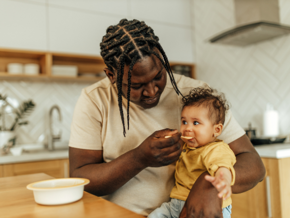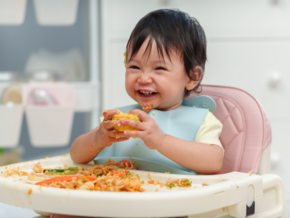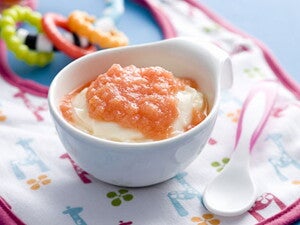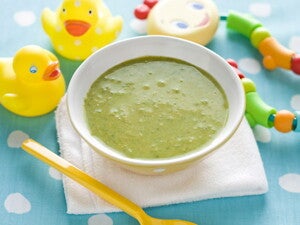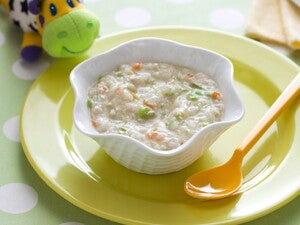
Best First Foods for Infants, and What to Avoid
There will be plenty of time for occasional treats when your baby is older, however particularly in the first two years when your baby’s tastes are developing, it is important for them to stick to natural wholesome baby food.
Making your own baby food
Homemade baby food is the best first foods for infants. Making your own meals means your food can be freshly prepared and nutrients retained. Homemade baby food can also have more flavour and a better texture profile than packaged baby foods. For fussy eating, you can tailor homemade baby food to their taste and texture preferences.
Once you have progressed from single ingredient foods, using a food processor, or mashing the family’s normal healthy meal is the simplest way to feed your baby. Just remove the baby’s portion before you add any salty sauces or ingredients your baby doesn’t eat yet. For inspiration, check out our newborn solid food recipes.
Organic baby foods
Certified organic foods mean they are free of conventional synthetic chemicals, fertilisers, or genetically modified organisms. However not all organic branded food are certified and are not necessarily healthier. Being organic doesn’t mean it will have no added sugars and salts, nor does it guarantee an appropriate balance of proteins, carbohydrates and fats. It is important to note that there are plenty of foods out there that are organic but don’t have an ‘organic’ label – for example many cows in Australia are pasture fed not grain fed, and may be hormone and antibiotic free without being certified organic.
Packaged foods
Packaged baby food has been sold for generations, and is a convenient safe option when travelling or out and about. There is a large range of products available for baby’s first solid foods. Packaged baby foods generally do not have the taste, texture or nutritional qualities of homemade fresh food.
Food hygiene
Food hygiene is particularly important for young babies. As any bottle feeding parent knows, sterilisation of bottles and boiling of water will greatly reduce the risk of a baby gastro intestinal infections. The same occurs when starting solids. Always use clean utensils when serving food. Processed baby food can be left unrefrigerated until opened, but chilled or frozen baby foods need careful handling. Follow pack instruction on storage and heating –always stir the food well and then test the temperature of the food before offering it to your baby. Discard uneaten food at the end of the meal.
First foods for infants to avoid
Salt
Babies tastes are different to adults. There is no need to season foods for one year olds or younger infants, with salt or high salt additives such as packaged stocks or sauces. Introduce infant food to your baby that don’t contain additives, preservatives or added chemicals. When it comes to babies – naturally wholesome is best!
Sugar
Baby’s first solid foods don’t need refined sugar and honey*; neither should be introduced before 12 months. Your baby’s sweet snacks could include fruit or fruit sweetened baby yoghurt and baby custard.
Avoid choking hazards
Whole nuts, popcorn, and over filling their mouth with food, should be avoided as they can pose as a choking hazard to children. Make sure your child sits properly while they are eating, and always supervise children when eating, even with low risk choking foods.
Frequently Asked Questions on Best For Foods For Infants
What baby food should I introduce first?
The best first foods for infants should be rich in iron, such as pureed meat, poultry and eggs, or a fortified infant cereal such as baby rice cereal. Infant cereals are easily digestible and can be mixed with breast milk, infant formula, or water to create a smooth, thin consistency for easy swallowing.
Should babies have fruits or veggies first?
It is very common to introduce various fruits and vegetables as baby’s first solid food, however ideally you should start with iron-rich foods first. This could include pureed meat, fish or poultry, or a baby rice cereal with added iron.
What veggies should a baby eat first?
Provided your baby’s first solid foods are rich in iron, the order in which you introduce vegetables to your baby's diet does not matter. Some common veggies to introduce first are potato, pumpkin, carrot, broccoli and zucchini, but don’t stop there as the more you introduce, the more variety of foods they’ll choose from when they are toddlers.
What fruit should I introduce to my baby first?
Provided your baby’s first solid foods are rich in iron, the order in which you introduce different fruits to your baby's diet does not matter. Some common fruits to introduce first are apple, pear, or peach. Aim to introduce a variety of different fruits over time, as the more they accept the easier it will be to provide them with a variety of foods to ensure a variety of nutrients are consumed.
Honey plays a crucial role in taste development, particularly in early life, as it introduces infants to a diverse range of flavors and helps shape their palate.
However, honey can contain the bacteria that may cause infant botulism. Consequently, honey should not be introduced before 12 months of age unless the spores of Clostridium botulinum have been inactivated by adequate high-pressure and high-temperature treatment, as used by industry.
Whenever honey is used in our products, it undergoes an externally validated treatment that ensures our products are safe to consume.
Sources:
- NHMRC “Giving your baby the best start, THE BEST foods for infants”. Accessed at https://www.eatforhealth.gov.au/sites/default/files/2022-09/n55e_infant_brochure_0.pdf
- Raising Children Network “Introducing solids: why, when, what and how”. Accessed at https://raisingchildren.net.au/babies/breastfeeding-bottle-feeding-solids/solids-drinks/introducing-solids
